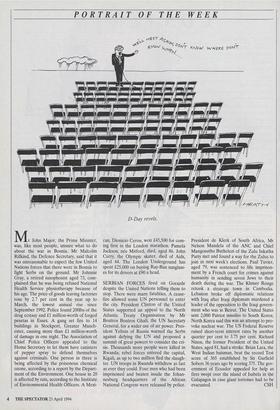PORTRAIT OF THE WEEK
D-Day revels.
Mr John Major, the Prime Minister, was, like most people, unsure what to do about the war in Bosnia. Mr Malcolm Rifkind, the Defence Secretary, said that it was unreasonable to expect the few United Nations forces that there were in Bosnia to fight Serbs on the ground. Mr Johnnie Gray, a retired saxophonist aged 73, com- plained that he was being refused National Health Service physiotherapy because of his age. The price of goods leaving factories rose by 2.7 per cent in the year up to March, the lowest annual rise since September 1992. Police found 200Ibs of the drug ecstasy and £1 million-worth of forged pesetas in Essex. A gang set fire to 14 buildings in Stockport, Greater Manch- ester, causing more than £1 million-worth of damage in one night. The Association of Chief Police Officers appealed to the Home Secretary to let them have canisters of pepper spray to defend themselves against criminals. One person in three is being affected by the poisonous chemical ozone, according to a report by the Depart- ment of the Environment. One house in 20 is affected by rats, according to the Institute of Environmental Health Officers. A Mead- can, Dionicio Ceron, won £45,500 for com- ing first in the London marathon. Pamela Jackson, née Mitford, died, aged 86. John Curry, the Olympic skater, died of Aids, aged 44. The London Underground has spent £25,000 on buying Ray-Ban sunglass- es for its drivers at £90 a head.
SERBIAN FORCES fired on Gorazde despite the United Nations telling them to stop. There were many fatalities. A cease- fire allowed some UN personnel to enter the city. President Clinton of the United States supported an appeal to the North Atlantic Treaty Organisation by Mr Boutros Boutros Ghali, the UN Secretary General, for a wider use of air power. Pres- ident Yeltsin of Russia warned the Serbs against defying the UN and proposed a summit of great powers to consider the cri- sis. Thousands more people were killed in Rwanda; rebel forces entered the capital, Kigali, as up to two million fled the slaugh- ter. UN troops in Rwanda withdrew as fast as ever they could. Four men who had been imprisoned and beaten inside the Johan- nesburg headquarters of the African National Congress were released by police. President de Klerk of South Africa, Mr Nelson Mandela of the ANC and Chief Mangosuthu Buthelezi of the Zulu Inkatha Party met and found a way for the Zulus to join in next week's elections. Paul Tuvier, aged 79, was sentenced to life imprison- ment by a French court for crimes against humanity in sending seven Jews to their death during the war. The Khmer Rouge retook a strategic town in Cambodia. Lebanon broke off diplomatic relations with Iraq after Iraqi diplomats murdered a leader of the opposition to the Iraqi govern- ment who was in Beirut. The United States sent 2,000 Patriot missiles to South Korea; North Korea said this was an attempt to pro- voke nuclear war. The US Federal Reserve raised short-term interest rates by another quarter per cent to 3.75 per cent. Richard Nixon, the former President of the United States, aged 81, had a stroke. Brian Lara, the West Indian batsman, beat the record Test score of 365 established by Sir Garfield Sobers 36 years ago by scoring 375. The gov- ernment of Ecuador appealed for help as fires swept over the island of Isabela in the Galapagos in case giant tortoises had to be


























































 Previous page
Previous page